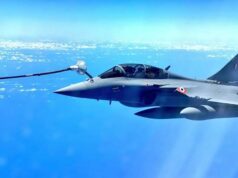Veteran with PTSD dog complains after Qantas made him ‘feel like a criminal’
Ted Tiessem was questioned for half an hour by Qantas staff at Brisbane Airport.
A north Queensland Army veteran with post-traumatic stress disorder (PTSD) says he was “made to feel like a criminal” by a Qantas staff member for trying to catch a flight with his disability assistance dog.
Ted Tiessem, 46, was preparing to fly from Brisbane to Townsville last month when he said he was escorted to an empty departures lounge and told he would not be allowed to fly.
“He got me to sit down and he said, ‘What are you doing in here with a service dog? You’re not allowed to be here with a service dog,'” Mr Tiessem told the ABC.
“I said, ‘I’m not leaving without my dog — I’ll sleep in the airport if I have to.'”
The Australian Army veteran developed PTSD after a truck crash in Malaysia in 1993 that killed five of his fellow servicemen and left him with head injuries.
He has relied on his dog Scout for the past five years to help manage his symptoms.
Mr Tiessem said he was questioned by the staff member for half an hour, despite showing proof that Scout was a Qantas-approved assistance animal.

Scout is a Qantas-approved assistance animal.
He has since lodged a complaint about the incident under the Queensland Guide, Hearing and Assistance Dogs Act.
“I felt completely discriminated against and made to feel like a criminal and an idiot,” Mr Tiessem said in his complaint.
“This incident was traumatic and, given I have PTSD, is not one I would like to repeat.
“People were staring at me and the guard stood over me as if I had broken the law.”
Mr Tiessem said he was eventually allowed to catch his flight, but the interaction left him feeling “threatened [and] embarrassed”.
“Just because you can’t see my disability with your own eyes does not mean that I’m [not] entitled to have an assistance dog,” he said.
“If I was a blind person, you’d be treating me a lot different.”

In 1993, Ted Tiessem was in a truck crash in Malaysia that killed five other servicemen.
In a statement, Qantas said the incident was a misunderstanding and offered an apology.
“Our customer service representative made contact with Mr Tiessem in the terminal to confirm his assistance dog’s eligibility to travel in the cabin,” a spokesperson said.

Mr Tiessem said he told Qantas staff he would not fly without Scout.
“Following this discussion, Scout and Mr Tiessem travelled as planned on their flight that afternoon.
“We’re disappointed Mr Tiessem had a frustrating experience, and we regret this process didn’t take place when he first checked in.”
Qantas said the relevant team had not received the necessary paperwork clearing Scout to fly.
Mr Tiessem said the flight was booked by the Department of Veterans Affairs, which also lodged the paperwork.
Gail Whiteside-Lane from Canine Helpers for the Disabled, who trained Scout with Mr Tiessem, said the incident was shocking.
“Veterans with PTSD and anxiety and depression, the whole point of them having that assistance dog is to enable them to live their lives again,” she said.
“They’ve served their country, they have experienced horrors that we never will and would never want to, and they come back and they try and get their life together, and having an assistance dog with them helps them do that.
“That’s their medicine — we would never tell somebody with a heart problem that they couldn’t take their tablets on the plane.”

Mr Tiessem says he was “made to feel like a criminal and an idiot”.
Ms Whiteside-Lane said Mr Tiessem’s experience was not an isolated incident.
“This year alone, we’ve had five of our veterans from Townsville encounter problems getting onto the flight with Qantas,” she said.
Mr Tiessem said he wanted a letter of apology to Canine Helpers from Qantas CEO Alan Joyce.
“And explain in his letter that he’s going to speak to all the staff from the ground up and educate them about assistance dogs … so no veteran has to go through this ever again.”




